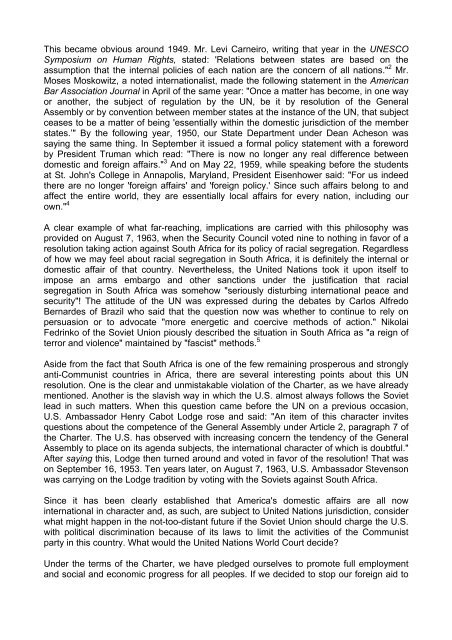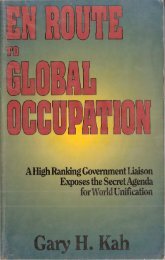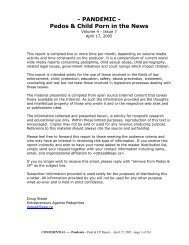G. Edward Griffin - The Fearful Master - PDF Archive
G. Edward Griffin - The Fearful Master - PDF Archive
G. Edward Griffin - The Fearful Master - PDF Archive
You also want an ePaper? Increase the reach of your titles
YUMPU automatically turns print PDFs into web optimized ePapers that Google loves.
This became obvious around 1949. Mr. Levi Carneiro, writing that year in the UNESCO<br />
Symposium on Human Rights, stated: 'Relations between states are based on the<br />
assumption that the internal policies of each nation are the concern of all nations." 2 Mr.<br />
Moses Moskowitz, a noted internationalist, made the following statement in the American<br />
Bar Association Journal in April of the same year: "Once a matter has become, in one way<br />
or another, the subject of regulation by the UN, be it by resolution of the General<br />
Assembly or by convention between member states at the instance of the UN, that subject<br />
ceases to be a matter of being 'essentially within the domestic jurisdiction of the member<br />
states.’" By the following year, 1950, our State Department under Dean Acheson was<br />
saying the same thing. In September it issued a formal policy statement with a foreword<br />
by President Truman which read: "<strong>The</strong>re is now no longer any real difference between<br />
domestic and foreign affairs." 3 And on May 22, 1959, while speaking before the students<br />
at St. John's College in Annapolis, Maryland, President Eisenhower said: "For us indeed<br />
there are no longer 'foreign affairs' and 'foreign policy.' Since such affairs belong to and<br />
affect the entire world, they are essentially local affairs for every nation, including our<br />
own." 4<br />
A clear example of what far-reaching, implications are carried with this philosophy was<br />
provided on August 7, 1963, when the Security Council voted nine to nothing in favor of a<br />
resolution taking action against South Africa for its policy of racial segregation. Regardless<br />
of how we may feel about racial segregation in South Africa, it is definitely the internal or<br />
domestic affair of that country. Nevertheless, the United Nations took it upon itself to<br />
impose an arms embargo and other sanctions under the justification that racial<br />
segregation in South Africa was somehow "seriously disturbing international peace and<br />
security"! <strong>The</strong> attitude of the UN was expressed during the debates by Carlos Alfredo<br />
Bernardes of Brazil who said that the question now was whether to continue to rely on<br />
persuasion or to advocate "more energetic and coercive methods of action." Nikolai<br />
Fedrinko of the Soviet Union piously described the situation in South Africa as "a reign of<br />
terror and violence" maintained by "fascist" methods. 5<br />
Aside from the fact that South Africa is one of the few remaining prosperous and strongly<br />
anti-Communist countries in Africa, there are several interesting points about this UN<br />
resolution. One is the clear and unmistakable violation of the Charter, as we have already<br />
mentioned. Another is the slavish way in which the U.S. almost always follows the Soviet<br />
lead in such matters. When this question came before the UN on a previous occasion,<br />
U.S. Ambassador Henry Cabot Lodge rose and said: "An item of this character invites<br />
questions about the competence of the General Assembly under Article 2, paragraph 7 of<br />
the Charter. <strong>The</strong> U.S. has observed with increasing concern the tendency of the General<br />
Assembly to place on its agenda subjects, the international character of which is doubtful."<br />
After saying this, Lodge then turned around and voted in favor of the resolution! That was<br />
on September 16, 1953. Ten years later, on August 7, 1963, U.S. Ambassador Stevenson<br />
was carrying on the Lodge tradition by voting with the Soviets against South Africa.<br />
Since it has been clearly established that America's domestic affairs are all now<br />
international in character and, as such, are subject to United Nations jurisdiction, consider<br />
what might happen in the not-too-distant future if the Soviet Union should charge the U.S.<br />
with political discrimination because of its laws to limit the activities of the Communist<br />
party in this country. What would the United Nations World Court decide?<br />
Under the terms of the Charter, we have pledged ourselves to promote full employment<br />
and social and economic progress for all peoples. If we decided to stop our foreign aid to



![Robert T McQuaid [rtmq@stn.net] Sent: Friday, October 29, 2004 12 ...](https://img.yumpu.com/51070071/1/190x245/robert-t-mcquaid-rtmqstnnet-sent-friday-october-29-2004-12-.jpg?quality=85)







